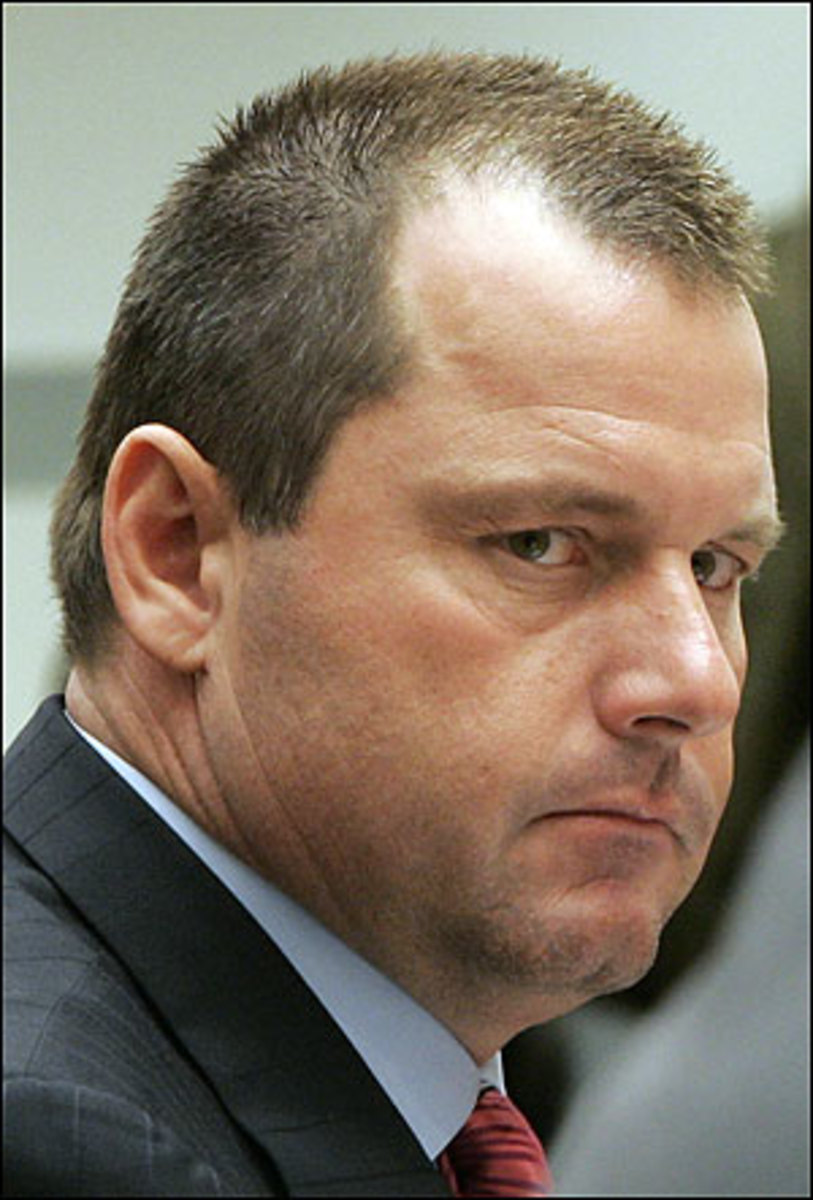No changeup
Along with other testimony on Wednesday, Roger Clemens swore on his good name that his identity was not stitched together by baseball seams.
"I cherish my Major League Baseball experience," Clemens said in his opening statement of a theatrical congressional hearing on steroids, "but I have always said that baseball is what I do; it is not who I am."
He was unbelievable - again. This is a father who named all four sons -- Koby, Kory, Kacy and Kody - in honor of a strikeout symbol. He calls them the K Boys.
Clemens cannot escape baseball-to-life parallels when he chooses to remain a 40-something superstar whose Rosin bag attachment has turned every spring into a retirement board game of Clue: Will he do it in Houston, with the Astros; will he do it in New York, as a Yankee; will he do it in Boston, with the Red Sox?
"I'm not great at retirement," he mentioned as an aside to one Congressman.
Clemens cannot define himself as anything other than baseball's Evita when he is willing to stand on any stage -- or Yankee Stadium balcony -- to forever indulge his Rocket-ness.
If anything, Clemens stepped on Capitol Hill as if it were another mound, with confrontation in his delivery, as a man in the double-breasted suit indistinguishable from the pitcher last seen in Yankee pinstripes.
Where was Joe Torre to relieve him? His loquacious lawyers stood as lousy impersonators, powerless to stop Clemens, reckless to even encourage his dubious steroid protest at the risk of a perjury investigation. The more their client talked, the more desperate he sounded as he willfully dragged his wife, friends, mother and even a nanny into his unseemly defense:
It was his wife who took the HGH from Brian McNamee and certainly not him. It was his buddy Andy Pettitte who misheard him -- over and over again, strangely enough - on the topic of steroids. It was his mother who first suggested he take B-12 in 1988 even though shots of the vitamin are usually reserved for patients suffering dementia. It was his nanny who Clemens inappropriately prepped and grilled for her interview with congressional leaders by reminding her -- not convincingly, it seems -- that he never attended a 1998 barbecue at the home Jose Canseco, an ex-slugger turned author of steroid potboilers.
Anything to win. Anything for an edge. No one has immunity from Roger's amazing feats of self-preservation. But Clemens wasn't trying to protect his name in the hearing; he was attempting to protect his relevance.
His great fear is vanishing from the public as a man beaten, the worst sin of all to Clemens. He couldn't stomach life as another Mark McGwire. He couldn't possibly disappear into society, vanish behind enclave walls and endure any rebukes from Hall of Fame voters quietly.
In the years since McGwire first told Congress he wasn't at the steroid hearings to talk about the past, he has lived small, noticeably diminished in physical size.
Clemens lives large - big Texas drawl, big Texas trucks -- to the point where he dabbles in tall tales of steroid denials and delusions of grandeur.
"I'm a public person. I am easy to find," Clemens told Congress before detailing, apropos of nothing, just how famous and fabulous he is. "When the commissioner asked me to get myself together to go out there, and the league asked me to put USA on my chest and represent my team, my country, I did everything I could do to get ready.
"When all (the steroid allegations) happened, the former president of the United States found me in a deer blind in south Texas and expressed his concerns that this was unbelievable and to stay strong and keep your head up high."
Would that be George H.W. Bush? Clemens is so tight with the Bushies, he once built a horseshoe pit on his Texas estate when he heard the ex-prez liked to play. His red-state devotions paid off in a tangible way at the hearings. Several Republicans reacted with deference to Clemens because a) they revered him and b) they thought the hearings had been co-opted by mic-needy Dems -- as if political opportunism is a blue-state thing.
It was a Vaudeville moment when Dan Burton (R-Ind.) theatrically scolded McNamee for having his pants on fire when he lied about his steroid links in press accounts -- as if lying to the press weren't sport for those in athletics or politics.
Some fawning pols couldn't separate Clemens the man from myth. Others were able to differentiate, as Representative Elijiah Cummings (D-Maryland) did when he told Clemens, "It's hard to believe you, sir. You're one of my heroes, but it's hard to believe you."
The most trustworthy voices of the hearing were heard through read depositions that contradicted Clemens. Chuck Knoblauch and Pettitte, in page after page, managed to drop their player shtick for a reality check, understanding this was not about keeping a clubhouse code but about exposing the dirty truth -- as much about themselves as Clemens.
"During his deposition, (Pettitte) was asked how he approached this difficult situation," Chairman Henry. A. Waxman explained in his opening statement, "and he said, quote, 'I have to tell you the truth. And one day I have to give an account to God and not to nobody else about what I've done in my life, and that's why I've said and shared the stuff that I wouldn't like to share with you all."
The whole truth isn't part of Clemens' delivery. Instead, it's confront, challenge and dare. That's Clemens as the Rocket, and the Rocket as Clemens. There is no separation of identities. Just the way he likes it. Just the way he needs it.






